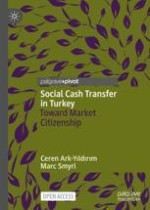Open Access 2021 | Open Access | Buch

Social Cash Transfer in Turkey
Toward Market Citizenship
verfasst von: Assist. Prof. Ceren Ark-Yıldırım, Assoc. Prof. Marc Smyrl
Open Access 2021 | Open Access | Buch

verfasst von: Assist. Prof. Ceren Ark-Yıldırım, Assoc. Prof. Marc Smyrl
This open access book asks whether cash-transfer programs for very low-income households promote social and economic citizenship and, if so, under what conditions. To this end, it brings together elements that are too often considered separately: the transformation of social and economic citizenship rights in a market-centered context, and the increasing popularity of cash transfer as an instrument both of social policy and humanitarian action. We link these by juxtaposing theoretical treatment of citizenship and inclusion with concrete policy case studies set in contemporary Turkey. Cases are taken both from domestic social policy and international relief efforts aimed at Syrian refugees. Theoretical discussion and case studies lead to the conclusion that cash transfer programs can promote economic and social inclusion – if deployed at an appropriate scale; if sufficient financial, technical, and social resources are available; and if program design and implementation promotes market inclusion of beneficiaries both as consumers and workers.